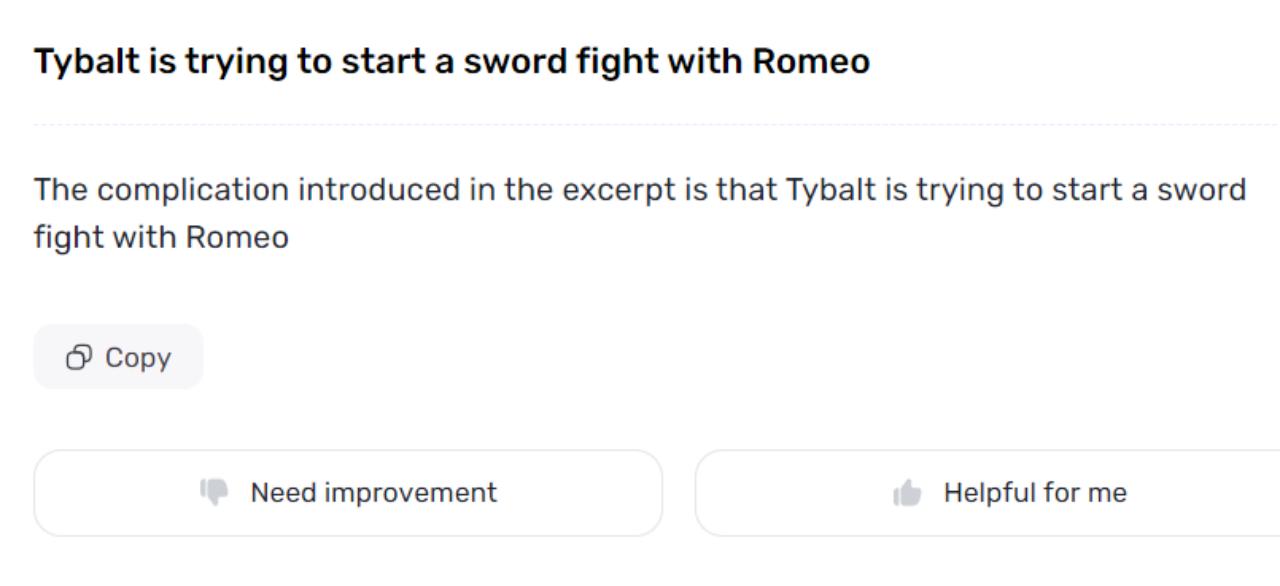Complications in literature are unanticipated challenges or events that interrupt a narrative's normal flow and create conflict and tension. The story gains depth and suspense from these complications, which captivate readers and propel the plot forward. Because they frequently reveal underlying themes and motivations, fully comprehending these complications is essential for fully comprehending the scope of the narrative as well as the development of the characters.
An innovative and potent method for assisting readers, students, and educators in analyzing literary excerpts like what complication is introduced in the excerpt? Is provided by Gauth, an advanced AI tool. Users of Gauth are able to quickly identify and comprehend these narrative complications, gaining a deeper understanding of the structure of the text and the author's intention.
Examining the Excerpt from Romeo and Juliet
It is found that the tension between Romeo and Tybalt keeps on increasing in Scene I of Act III as TyBalt accesses Romeo a lot. Tybalt has proactively voiced his disappointment concerning Romeo's cooperation at the Capulet party, which he sees as a singular insult, going before this quarrel.
Romeo reacts with unusual calm and restraint in spite of Tybalt's aggression. Due to Romeo's recent secret marriage to Juliet, Tybalt's cousin, he expresses his love for Tybalt. Romeo's tranquil attitude and refusal to battle are expected to de-raise what is happening and mirror his new familial association. Romeo's words, however, do not appease Tybalt.
He sees Romeo's calmness as a weakness and continues to intend to provoke a duel. The fact that Tybalt refuses to accept peace or reconciliation by insisting on fighting only serves to exacerbate the situation.
Identifying the Complication
To distinguish the complications in this passage, follow these means:
➔ Identify the Initial Situation
At the starting point of the scene, you will see a harsh and heated argument between Romeo and Tybalt. Romeo tries to keep his cool and avoid a fight while Tybalt is furious to the brim.
➔ Notice the Change
Romeo is called a villain by Tybalt, who calls him an insult and demands that he fight with his sword. This denotes a critical heightening from verbal showdown to the danger of actual viciousness.
➔ Analyze the Effects
Tybalt's persistent aggression forces the situation toward violence, despite Romeo's attempts to avoid conflict by expressing his love for Tybalt and declining the challenge. Tybalt becomes even more enraged as a result of Romeo's refusal to fight which makes the conflict inevitable.
Utilizing Gauth to Analyze Literary Excerpts
Gauth is an adaptable artificial intelligence tool that can significantly improve the process of analyzing literary excerpts, particularly when it comes to identifying textual issues. Here is a bit-by-bit guide on the most proficient method to involve Gauth for scholarly examination:
Step 1. Input the Excerpt
To begin, copy and paste the literary work's excerpt into Gauth. This could be a section from a novel, a scene from a play, or some other fragment of text you wish to investigate. Gauth upholds different organizations and can deal with text input proficiently.
Step 2. Break Down Sentences
Allow Gauth to analyze complex sentences by breaking them down. The tool can break down complicated sentence structures, making syntax and meaning clearer. This feature is especially useful for deciphering muddled passages that might be difficult to manually interpret.
Step 3. Identify Changes in Tone and Language
Look for changes in tone and language that point to a problem or conflict. By analyzing the diction, punctuation, and overall style of the text, Gauth can assist you in identifying these subtle changes. For instance, a shift from quiet discourse to forceful language can show an arising struggle.
Step 4. Review Gauth's Analysis
Utilize Gauth's insights to identify the complication and comprehend how it affects the narrative. An analytical summary with key findings will be provided by the tool, making it simpler to comprehend how the complication develops and influences the narrative.
Ending Thoughts
Recognizing complications in a story is fundamental for grasping the profundity of the story and the characters' turn of events. Gauth is a useful tool that can help with this analysis, making it faster and more accurate. Take a stab at involving Gauth for your next scholarly examination venture and perceive how it can improve how you might interpret writing.


